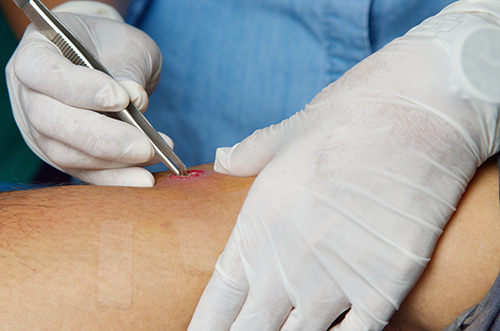When facing an abscess, many wonder when it is urgent enough to seek medical help. An abscess is a build-up of pus under the skin, often painful, swollen, and red. Knowing when to consider abscess drainage should never be taken lightly because timely action can make a significant difference. Expert advice reveals that if an abscess grows large, persists for more than a few days, or is accompanied by fever, immediate medical attention is advisable. When symptoms escalate or show no signs of improvement, it can be a clue that intervention, such as drainage, is required. Addressing an abscess promptly reduces the risk of infection traveling to other parts of the body. Therefore, recognizing the signs and understanding their severity helps avoid complications.
Introduction
An abscess forms when pus collects because of an infection. Early detection matters because it stops things from getting worse. The infection can start when bacteria get under your skin. This can happen fast and cause more pain and discomfort. Knowing about abscesses early helps you get treatment before things get serious. Early treatment not only stops the infection from spreading but also avoids tough procedures.
Getting treatment soon for an abscess is important to avoid problems. Quick action keeps the infection from getting bigger or reaching other places in your body. If left alone, it can turn into a bigger issue, affecting organs and leading to more symptoms. Acting early means less time spent healing and fewer hospital visits. Professional help with abscess drainage makes the recovery easier and faster.
Recognizing the Symptoms and Signs of an Abscess
Abscesses come with clear and irritating symptoms that are noticeable. The initial symptom you might see is redness around the trouble area. Swelling will follow, making the area increase in size and appear puffy. Pain is common, turning that spot sensitive to the touch.
If ignored, a more prominent issue arises—pus starts to appear. This fluid hints at the infection growing deeper or more serious. Knowing these signs helps you act fast to prevent worsening.
Reaching out for expert advice when these signs show up saves time. A quick check-in with a doctor lets you get tips specific to your condition. Professionals can determine if the abscess needs a drain procedure. This expert input avoids risky guessing and wrong treatments. Doctors guide a patient towards effective care methods for quicker healing.
The Dangers of Unmanaged Abscesses
Neglecting an abscess can lead to troublesome outcomes. As infections get worse, they spread to other body parts through blood. This can bring about things like fever, chills, or feeling bad overall. If you ignore an abscess, it might lead to sepsis, which can be life-threatening. Your internal organs may get affected, resulting in more health problems in the future.
Getting help right away decreases risks of bigger health troubles. Quick attention lowers the chance of lasting issues and helps faster healing. Doctors know how to deal with abscesses safely, ensuring treatment is effective. It’s important to act fast to keep your health in good condition.
Exploring Treatment Options in India
In India, dealing with an abscess means exploring different treatments. Drainage therapy is the go-to plan for bigger or deeper abscesses. This helps release pus, which reduces pain and pressure considerably. For smaller and simpler abscesses, antibiotics or warm compresses may be used instead. Each treatment plan is based on specific patient needs.
In India, skilled healthcare professionals are masters at treating abscesses effectively. These experts know the ins and outs of managing infections successfully. Their abscess drain techniques are precise and reliable every time. With such skilled hands, patients experience minimal risks during procedures. Access to such professionals gives patients peace of mind and quicker recoveries.
Demystifying the Abscess Drain Procedure
The doctor starts by numbing the skin around the abscess. A small cut is made for draining the pus inside, reducing infection chances. To cleanse it thoroughly, they might use a saltwater rinse. Sometimes a small tube is used to help drain any leftover pus.
Managing pain during and after the draining process is key to comfort. Regular pain relievers can be suggested to reduce discomfort felt later. How fast you recover depends on where the abscess was and how big it was. It generally takes days or weeks, and keeping it clean speeds healing.
Clearing Misconceptions About Abscess Treatment
It’s a common myth that abscesses heal without any intervention at all. Antibiotics can’t always handle an abscess when pus is present. Draining abscesses is important because it speeds up healing time. Waiting for self-healing often leads to more serious problems later. Seeking professional guidance can lead to better treatment outcomes.
Evidence shows that abscess treatment works best with timely intervention. Research supports drainage as an effective way to prevent complications. Professional guidance helps determine the best treatment plan for each person. Trusting facts, not myths, leads to fewer health misunderstandings.
Emerging Technologies in Abscess Treatment
Technology is changing how we treat abscesses, with new tools emerging. Advances in treating abscesses focus on less complex ways to help. One example is using ultrasound to guide doctors during a procedure. This high-tech method helps make smaller cuts and targets the right area. It means patients can get better faster and go through less pain.
In India, more and more hospitals are using these high-tech ways to treat abscesses. These places mix old methods with new technology for treating abscesses efficiently. It helps doctors find problems quickly and targets treatment effectively. The growing use of these tools ensures everyone in India can get great health care. It means that abscess drain processes meet high standards everywhere across the country.
Guidelines for Post-Drainage Care
After having an abscess drain, it’s important to care for yourself properly. Follow these steps for a better and faster healing process:
- Ensure Cleanliness Around Grant Drain: Softly cleanse the wound using clean water and mild soap. Dry the area gently with a cloth.
- Handle Wound Dressings Carefully: Follow the doctor’s advice about changing bandages regularly. It helps you avoid any infection that may crop up.
- Take Your Medications Properly: Even when feeling well, finish all pain medication or antibiotics prescribed.
- Avoid Doing Strenuous Activities: Allowing your body some rest encourages quicker healing. Heavy tasks might disrupt recovery.
- Look Out for Problems: Inform your doctor if the wound is swelling or looks red.
Healing becomes easier when you prioritize these care steps daily, substantially lowering risk of problems.
Maintaining hygiene assists in reducing chances of future complications. Regular cleaning keeps away harmful germs and provides comfort. Consistent follow-up meetings with healthcare specialists monitor your wound’s healing journey. They help identify issues early and suggest solutions if the healing seems slow. Diligent care by attending these follow-ups makes recovery more pleasant.
Avoiding the Pitfalls of Delayed Drainage
Delaying when you should drain an abscess can be risky. If not treated, it can hurt a lot, making life tough. An abscess that hangs around can tear tissue and lead to scars. There’s also a chance it might spread and cause bigger health issues. It’s best to deal with an abscess quickly and avoid these complications.
Taking action with health concerns early is really smart. Knowing the signs and getting help soon is important. Listening to doctors about drainage fast can ease pain much quicker. Being proactive about health keeps you feeling good and away from long-lasting pain.
Consulting Healthcare Professionals First
Seeing a doctor first is really important for any health issue. They know what to do and can stop things from getting worse. When you treat yourself without asking them, you might make things worse instead. It’s always best to get their opinion.
Home remedies seem like an easy solution but often cause more problems. They can be risky because they aren’t checked by professionals. If you use the wrong thing, you might actually make the infection worse. In the end, this could mean a longer time to get better. Always check with a doctor before trying anything new.
Voices from the Ground: Patient Testimonials
Stories from patients in India show the reality of abscess drain procedures. Ramesh, a patient from Delhi, explains that immediate consultation was crucial. His quick action led to effective treatment and avoided complications.
Priya, from Bangalore, shares her experience on recovery tips. She says following aftercare instructions meant she healed quickly without any problems.
Patients often feel relief after having professional treatment for an abscess. Many speak about how delaying action only worsened their condition.
These stories from those who acted soon teach a valuable lesson. Prompt medical intervention means benefits like quick and smooth recoveries. Success stories stress the importance of trusting medical professionals for health.
Navigating the Financial Landscape: Costs and Coverage
Abscess treatment costs vary a lot in India, from INR 500 to INR 5,000, based on severity. Prompt action keeps costs lower, avoiding complex interventions and added expenses.
Many insurance plans include abscess treatment under surgical coverage. Always check your policy to be sure about coverage details. Hospitals might offer payment plans if you’re uninsured. Discuss financial options with your doctor for stress-free treatment.
Conclusion
Knowing about abscess drain helps you stay healthy. Finding out the right time for help can stop any issues fast. Acting quickly makes the healing better and shorter.
Follow your doctor’s advice instead of trying random home cures. Pay close attention to any early signs and get medical care soon. Doctors offer the best help for abscesses, keeping your health guarded.

